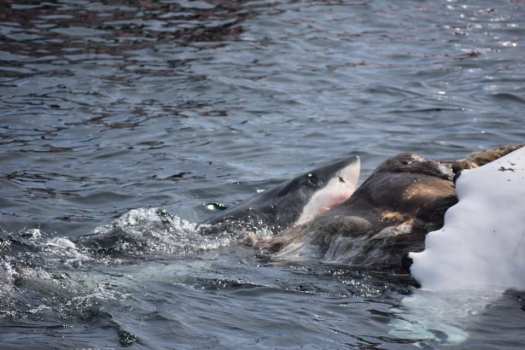
Sharks were spotted chomping down on a dead whale off Cape Cod this week, including a massive 18-foot-long apex predator enjoying the meal of its life.
Captain John Goggin was leading a whale watch out of Plymouth when he came upon a dead humpback whale in Cape Cod Bay near Provincetown.
While taking a look at the dead whale, two “huge” great white sharks arrived for a feast.
“It was the first time I had ever seen this happen,” said Goggin, of Captain John Boats.
“People on board were pretty excited,” he added. “There was a lot of yelling, ‘Oh my God! Wow!'”
The larger of the two sharks was estimated to be a whopping 18 feet long.
Shark researcher John Chisholm called the shark “enormous.”
“One of the hardest things to communicate to people is how massive white sharks can be,” he tweeted. “Until you see one in person, it’s hard to appreciate the girth which may be more impressive than length.”
Sharks feeding on a dead whale happens occasionally off the Cape, said Peter Corkeron, who leads the whale research team at the New England Aquarium.
Most of the focus along the Cape is great whites feasting on seals, but whales can be a massive food resource for sharks.
“A dead whale is a lot of really easy food for great white sharks,” Corkeron said. “They’re easy to find. They float and hang around.”
“A dead whale is like the biggest smorgasbord a shark could ever dream of,” he added.
The Center for Coastal Studies responded to the report of a humpback whale carcass floating south of Stellwagen Bank.
The scientists were able to identify the individual as an unnamed catalogued whale, the 2020 calf of Venom. This whale was well-known to CCS scientists, as well as whale watchers off the coast of Massachusetts. The cause of his death is not known at this time.
“While it is sad to learn that an individual has died, documenting these events is essential for long-term population studies,” CCS wrote on Facebook, later adding, “Remember to keep your distance from whale carcasses, whether at sea or on land. Conditions can be more dangerous than they appear, especially if predators are in the area, and touching marine mammals is prohibited by law, even after death.”



